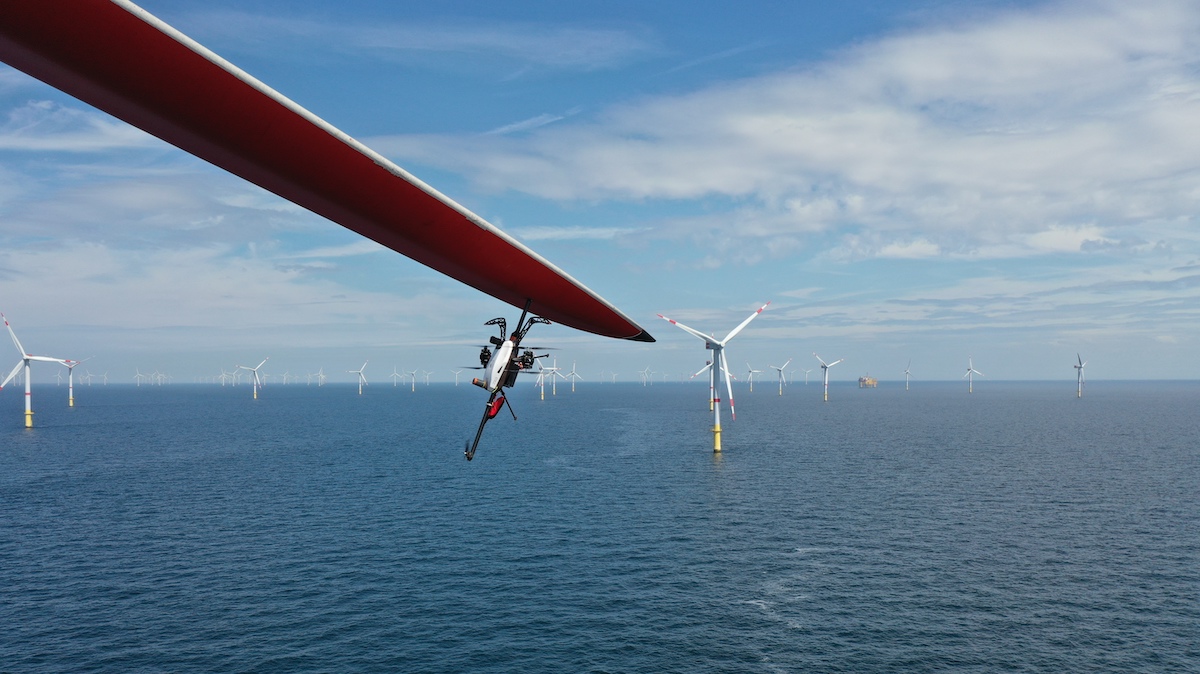We have only touched the surface of what drones can do and how ubiquitous they will become. This is also true in industry, where they have the potential to replace human labor in risky activities such as inspection at height.
Swiss startup rel=”nofollow” href=”https://voliro.com/”Voliro operates in this space, with flying robots that can inspect wind turbines, overwater structures, and other infrastructure that’s hazardous for humans to reach because of factors such as height and weather conditions.
This is more than a visual inspection for glaring issues like corrosion; Voliro’s drones can poke around with sensors that can perform tasks such as dry film thickness, often eliminating the need for people on ropes. Yet, don’t expect CEO Florian Gutzwiller to tell you how many labor casualties the company’s drones are preventing. “I’m Swiss. If I were an American CEO, I would say we are saving lives every day, but I think it’s too aggressive,” he told TechCrunch.
Cultural differences aside, Gutzwiller has another reason to emphasize other aspects than accident prevention, such as productivity: Even when all goes well, which is luckily most often the case, industrial inspections cause downtime. Avoiding this downtime can save a significant amount of money for Voliro’s clients, which include Chevron and Holcim, as well as inspection and maintenance service providers.
“One of my favorite examples is flare stacks,” Gutzwiller said. “Because a flare stack is hot, you have to turn it off. You have to cool it down. You have to build a scaffold. Then you do the inspection. After doing the inspection, remove the scaffold, and then turn it on again. This can be a matter of days or weeks, and we can do it in 20 minutes.”
Voliro’s competitors include rel=”nofollow” href=”https://www.avestec.com/”Avestec, Flyability, and Skygauge, but Gutzwiller thinks versatile hardware gives it an edge. There are its sensors that can handle heat, combined with the core innovation it is based on: a tiltable rotor that gives freedom of 360-degree motion to its robots, meaning they can work on ceilings and apply pressure without losing stability.
This advanced rotor was developed by some of Voliro’s team within the Autonomous Systems Lab rel=”nofollow” href=”https://www.voliro.ethz.ch/”at ETH Zurich, before the startup became one of its many spinoffs in 2019. The commercial launch of its drones followed three years later, but that’s not what it sells: Its business model is a B2B subscription.
This model has many advantages, Gutzwiller said. For customers, it means accessing hardware and software upgrades as they are developed, in addition to getting support. For the company, it means recurring revenue that can fund R&D and showing the kind of cash flow that investors like to see.
This may explain why the company recently managed to raise $12 million, despite a challenging fundraising environment for startups and robotics. Bringing its funding to date to $22 million, this new capital injection was led by Cherry Ventures, with additional investment from existing business angels, family offices, and a conventional debt facility as a minority part of the round, according to the company.
Commercial traction helped with VCs and bankers, but there was still an element of luck and serendipity. Voliro pitched many VC firms, as is the norm these days, but it hadn’t pitched Cherry Ventures until a Mexican entrepreneur Gutzwiller met randomly at a bus stop in the mountains recommended him to do so. Fast forwarded a few months, and Cherry led Voliro’s Series A round.
Gutzwiller’s journey with Voliro was also serendipitous. After selling his company Open Systems rel=”nofollow” href=”https://eqtgroup.com/news/2017/eqt-mid-market-europe-invests-in-open-systems-ag/”>to private equity in 2017, Gutzwiller became an angel investor, but he didn’t stop at investing into the ETH spinoff: He became an entrepreneur in residence at the company, then its executive chairman, until he rel=”nofollow” href=”https://www.linkedin.com/pulse/mina-kamel-steps-down-ceo-voliro-ag-board-appoints-executive-/”>replaced former CEO Mina Kamel in November 2022.
Gutzwiller is now in charge of spearheading Voliro’s growth, and he’s bullish about its platform approach. For instance, it will soon support third-party sensors that can detect corrosion under insulation. In the longer term, it could go further toward repairs, for instance, by having its robots remove rust or add coating themselves. But first, the company will work on expanding its client base across oil and gas, energy, and other industry sectors that could benefit from needing less human work at height.
Disclaimer
We strive to uphold the highest ethical standards in all of our reporting and coverage. We StartupNews.fyi want to be transparent with our readers about any potential conflicts of interest that may arise in our work. It’s possible that some of the investors we feature may have connections to other businesses, including competitors or companies we write about. However, we want to assure our readers that this will not have any impact on the integrity or impartiality of our reporting. We are committed to delivering accurate, unbiased news and information to our audience, and we will continue to uphold our ethics and principles in all of our work. Thank you for your trust and support.



![[CITYPNG.COM]White Google Play PlayStore Logo – 1500×1500](https://startupnews.fyi/wp-content/uploads/2025/08/CITYPNG.COMWhite-Google-Play-PlayStore-Logo-1500x1500-1-630x630.png)